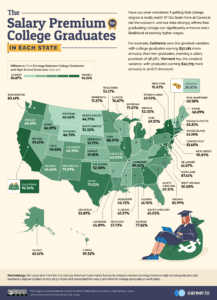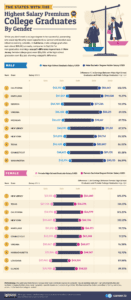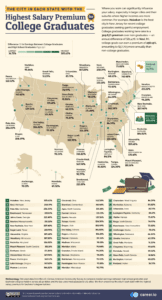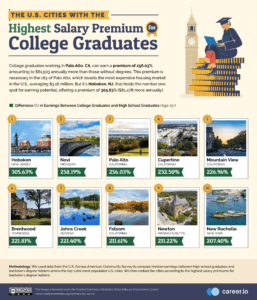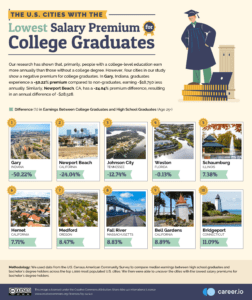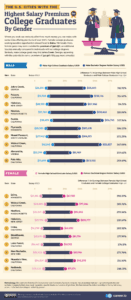Campus News, Campus News
What is the Wage Gap Between College and High School Graduates in Each State?
Editorial Staff

It’s true that getting a college degree can open the door to impressively high-paying jobs, but where in the U.S. do college graduates earn much more than workers without degrees? Career.io delved into earnings data across the country to find out.
For many people across the U.S., going to college is the inevitable next step after graduating high school. But it’s not just an unquenchable thirst for knowledge behind that trend — there’s also the expectation that bagging a college degree will open the door to high-paying jobs, with seven in ten Americans believing that college-educated people have higher earnings compared to high school graduates.
Of course, plenty of young professionals straight out of high school have jobs that rake in the big bucks — but by and large, the typical college graduate in the U.S. will make $1.2 million more over their lifetime than someone who hasn’t been to college, and is 3.5 times less likely to experience poverty. Male graduates, in particular, will have the highest salaries.
This got the team here at Career.io pondering: where in the U.S. will college graduates make the biggest salary premium over a local worker who hasn’t been to college? And where will male and female graduates outearn their counterparts without a degree the most?
For every state and the 1,000 most populated cities in the U.S., Career.io used Census data to calculate the percentage difference between the median earnings of local college graduates and high school graduates over the age of 25.
Methodology Behind Study
To determine where college graduates earn the biggest salary premium in the United States, Career.io focused on the 1,000 most populated U.S. cities and each U.S. state.
For each city and U.S. state, they used the U.S. Census American Community Survey (2022) to discover the median earnings in the past 12 months (inflation-adjusted) for the population aged 25 years and over among High School Graduates, High School Graduate Males, High School Graduate Females, Bachelor’s Degree Holders, Bachelor’s Degree Holding Males, and Bachelor’s Degree Holding Females.
The Career.io team calculated the percentage difference in earnings for each location between high school graduates and bachelor’s degree holders. they repeated this analysis for male and female high school graduates vs. bachelor’s degree holders of the same gender.
After that, the study ranked the cities, cities per state, and states based on having the highest salary premium (%) for bachelor’s degree holders.
Results
The analysis of this data is correct as of February 2024.
SEE ALSO: Which U.S. Companies Pay the Most for Entry-Level Jobs?


